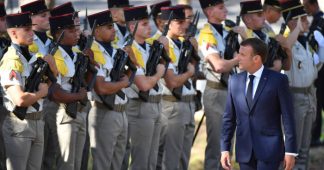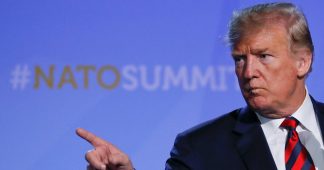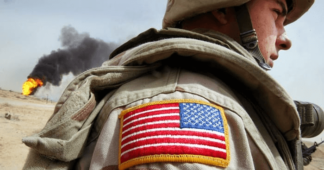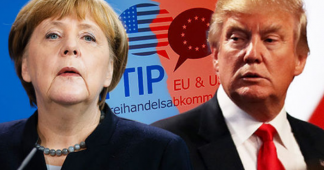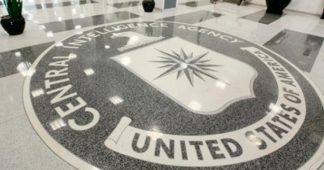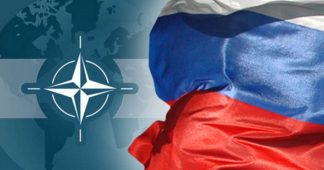Posted on
Judith Miller and AF General Philip Breedlove are back! At first I thought it a sickening flashback. Two nights ago, there were Judy Miller and former NATO commander Philip Breedlove on TV pontificating on Ukraine.
For younger readers, Judy was the NY Times Archdeacon blessing all those reports of “weapons of mass destruction in Iraq (that weren’t there) and ties between Iraq and al-Qaeda (that weren’t there either).
As for Breedlove, as a sad sign of the times, he appears (via Radio Free Europe) on Reader Supporter News, with zero allusion to his pedigree on truth and falsehood (See: “FOCUS: Former NATO Commander Says Western Fears of Nuclear War Are Preventing a Proper Response to Putin.”)
Breedlove’s all-too-familiar, damn-the-torpedoes line on the need to confront Russia head-on in Ukraine brought back more sickening memories. For this is precisely what he tried to do – behind President Obama’s back – when he was commander of NATO troops (2013-2016). It got so bad that we Veteran Intelligence Professionals for Sanity (VIPS) sought to warn German Chancellor Angela Merkel about Breedlove’s checkered record for credibility in advance of a NATO summit in early July, 2014. We urged Merkel to temper Breedlove’s distemper.
Verbatim excerpts are below:
“We longtime U.S. intelligence officers again wish to convey our concerns and cautions directly to you prior to a critically important NATO summit – the meeting that begins on July 8 in Warsaw. We were gratified to learn that our referenced memorandum reached you and your advisers before the NATO summit in Wales, and that others too learned of our initiative via the Sueddeutsche Zeitung, which published a full report on our memorandum on Sept. 4, the day that summit began.
Wales to Warsaw
“The Warsaw summit is likely to be at least as important as the last one in Wales and is likely to have even more far-reaching consequences. We find troubling – if not surprising – NATO Secretary General Jens Stoltenberg’s statement at a pre-summit press event on July 4 that NATO members will agree to “further enhance NATOs military presence in the eastern part of the alliance,” adding that the alliance will see its “biggest reinforcement since the Cold War.”
“The likelihood of a military clash in the air or at sea – accidental or intentional – has grown sharply, the more so since, as we explain below, President Obama’s control over top US/NATO generals, some of whom like to play cowboy, is tenuous. Accordingly we encourage you, as we did before the last NATO summit, to urge your NATO colleagues to bring a “degree of judicious skepticism” to the table at Warsaw – especially with regard to the perceived threat from Russia.
“Many of us have spent decades studying Moscow’s foreign policy. We shake our heads in disbelief when we see Western leaders seemingly oblivious to what it means to the Russians to witness exercises on a scale not seen since Hitler’s armies launched “Unternehmen Barbarossa” 75 years ago, leaving 25 million Soviet citizens dead. In our view, it is irresponsibly foolish to believe that Russian President Vladimir Putin will not take countermeasures – at a time and place of his own choosing.
“Putin does not have the option of trying to reassure his generals that what they hear and see from NATO is mere rhetoric and posturing. He is already facing increased pressure to react in an unmistakably forceful way. In sum, Russia is bound to react strongly to what it regards as the unwarranted provocation of large military exercises along its western borders, including in Ukraine.
“Before things get still worse, seasoned NATO leaders need to demonstrate a clear preference for statesmanship and give-and-take diplomacy over saber-rattling. Otherwise, some kind of military clash with Russia is likely, with the ever-present danger of escalation to a nuclear exchange.
“Extremely worrisome is the fact that many second-generation NATO leaders seem blithely unaware – or even dismissive – of that looming possibility. Demagoguery like that coming from former Polish President Lech Walesa, who brags that he would “shoot” at Russian jets that buzz US destroyers assuredly are not at all helpful. Walesa’s tone, however, does reflect the macho attitude prevailing today in Poland and some other NATO newcomers.
“We believe Foreign Minister Frank-Walter Steinmeier was correct to point out that military posturing on Russia’s borders will bring less regional security. We applaud his admonition that, “We are well advised not to create pretexts to renew an old confrontation.”
A Need For Candor
“Speaking of “pretexts to renew an old confrontation,” we believe the time has come to acknowledge that the marked increase in East-West tensions over the past two years originally stemmed from the Western-sponsored coup d’état in Kiev on Feb. 22, 2014, and Russia’s reaction in annexing Crimea.
“Although we have a cumulative total of hundreds of years of experience in intelligence, we had never before seen planning for a coup d’état exposed weeks in advance – and then carried out anyway. Few seem to remember that in early February 2014, YouTube published a recording of an intercepted conversation between US Assistant Secretary of State Victoria Nuland and the US ambassador in Kiev, during which “Yats” (for Arseniy Yatsenyuk) was identified as Washington’s choice to become the new prime minister of the coup government in Kiev. …
“We suggest that it is past time for Western leaders to admit that there is not one scintilla of evidence of any Russian plan to annex Crimea before the coup in Kiev and the coup leaders began talking about Ukraine joining NATO. If senior NATO leaders continue to be unable or unwilling to distinguish between cause and effect, increasing tension is inevitable with potentially disastrous results – all of them unnecessary and avoidable, in our view.
Ukraine: Still Festering
“In our August 2014 memorandum for you, we suggested that you be “appropriately suspicious of charges made by the US State Department and NATO officials alleging a Russian invasion of Ukraine.” Actually, the gravity of the situation was considerably worse than we realized at the time.
“We now know that US Air Force Gen. Philip Breedlove, who was Supreme NATO Commanderuntil two months ago, was pressing hard for confrontation with Russia and the anti-coup separatists in eastern Ukraine. This comes through clearly in Breedlove’s recently disclosed emails, which now confirm what we believed in 2014; namely, that everyone needed to examine closely Breedlove’s exaggerated claims, many of them based on fuzzy photos and other highly dubious “intelligence.”
“Lobbying for approval to wage a proxy war with Russia in Ukraine, Breedlove was highly critical of President Barack Obama’s policy, which Breedlove disparaged as simply: “Do not get me into a war.” (As though this were some kind of cowardly order!)
The emails show that behind Obama’s back, Breedlove kept trying to “leverage, cajole, convince or coerce the US to react” to Russia. One of Breedlove’s email correspondents wrote back to him: “Given Obama’s instruction to you not to start a war, this may be a tough sell,” but this did not stop Breedlove from trying.
“In 2015, as your own intelligence analysts were able to tell you, Breedlove went beyond hyperbole to outright fabrication with claims that “well over a thousand combat vehicles, Russian combat forces, some of the most sophisticated air defense weapons, and battalions of artillery” had been sent to eastern Ukraine.
“These were the kinds of faux claims Breedlove used in attempts to enlist help from the senior military and Congress in getting Obama to supply weapons to Ukrainian armed forces.
“Lest we seem to be singling out Gen. Breedlove, his predecessor as Supreme NATO Commander, Adm. James Stavridis, hardly provided good example. A year after the US led some NATO countries in a Blitz of aircraft and missile strikes against Libyan President Muammar Gaddafi, Stavridis and former US Ambassador to NATO Ivo Daalder wrote in Foreign Affairs: “NATO’s operation in Libya has rightly been hailed as a model intervention.”
“The operation was just the opposite, of course. The chaos now reigning in Libya, with hundreds of refugees drowning in the Mediterranean, offers abundant proof that your government’s decision to keep Germany at arms-length from that “model intervention” was a wise one.
“While it is somewhat awkward for us to offer such candid comments on the character and caliber of the most senior US generals and admirals, many of whom end up getting appointed to senior political positions at NATO – such a critique is unavoidable. The important reality to which we draw your attention pertains not only to their qualifications, but also to their dismissive attitude toward President Obama.
“We observed in our Aug. 30, 2014 memorandum that President Obama “has only tenuous control over the policymakers in his administration.” That this includes senior military leaders can be seen in Obama’s failure to remove Gen. Breedlove, who – in addition to his intense maneuvering behind Obama’s back – made little effort to hide his open disdain for the cautious approach of his commander in chief toward the possibility of armed confrontation in volatile places like Ukraine. …”
The following is from the first VIPs Memorandum for Chancellor Merkel (Aug. 30, 2014) – about what is known about the credibility due to former leaders of NATO.
“Hopefully, your advisers have reminded you of NATO Secretary General Anders Fogh Rasmussen’s checkered record for credibility. It appears to us that Rasmussen’s speeches continue to be drafted by Washington. This was abundantly clear on the day before the U.S.-led invasion of Iraq when, as Danish Prime Minister, he told his Parliament: “Iraq has weapons of mass destruction. This is not something we just believe. We know.”
“Photos can be worth a thousand words, they can also deceive. We have considerable experience collecting, analyzing, and reporting on all kinds of satellite and other imagery, as well as other kinds of intelligence. Suffice it to say that the images released by NATO on Aug. 28 provide a very flimsy basis on which to charge Russia with invading Ukraine. Sadly, they bear a strong resemblance to the images shown by Colin Powell at the UN on Feb. 5, 2003, that, likewise, proved nothing.
“That same day, we warned President Bush that our former colleague analysts were “increasingly distressed at the politicization of intelligence” and told him flatly, “Powell’s presentation does not come close” to justifying war. We urged Mr. Bush to “widen the discussion … beyond the circle of those advisers clearly bent on a war for which we see no compelling reason and from which we believe the unintended consequences are likely to be catastrophic.”
“Consider Iraq today. Worse than catastrophic.
“Although President Vladimir Putin has until now showed considerable reserve on the conflict in the Ukraine, it behooves us to remember that Russia, too, can “shock and awe.” In our view, if there is the slightest chance of that kind of thing eventually happening to Europe because of Ukraine, sober-minded leaders need to think this through very carefully.”
END of excerpt from Aug. 30, 2014 VIPs Memorandum for Chancellor Merkel.
* Ray McGovern works with Tell the Word, a publishing arm of the ecumenical Church of the Saviour in inner-city Washington. His 27-year career as a CIA analyst includes serving as Chief of the Soviet Foreign Policy Branch and preparer/briefer of the President’s Daily Brief. He is co-founder of Veteran Intelligence Professionals for Sanity (VIPS).
Published at www.antiwar.com
We remind our readers that publication of articles on our site does not mean that we agree with what is written. Our policy is to publish anything which we consider of interest, so as to assist our readers in forming their opinions. Sometimes we even publish articles with which we totally disagree, since we believe it is important for our readers to be informed on as wide a spectrum of views as possible.
